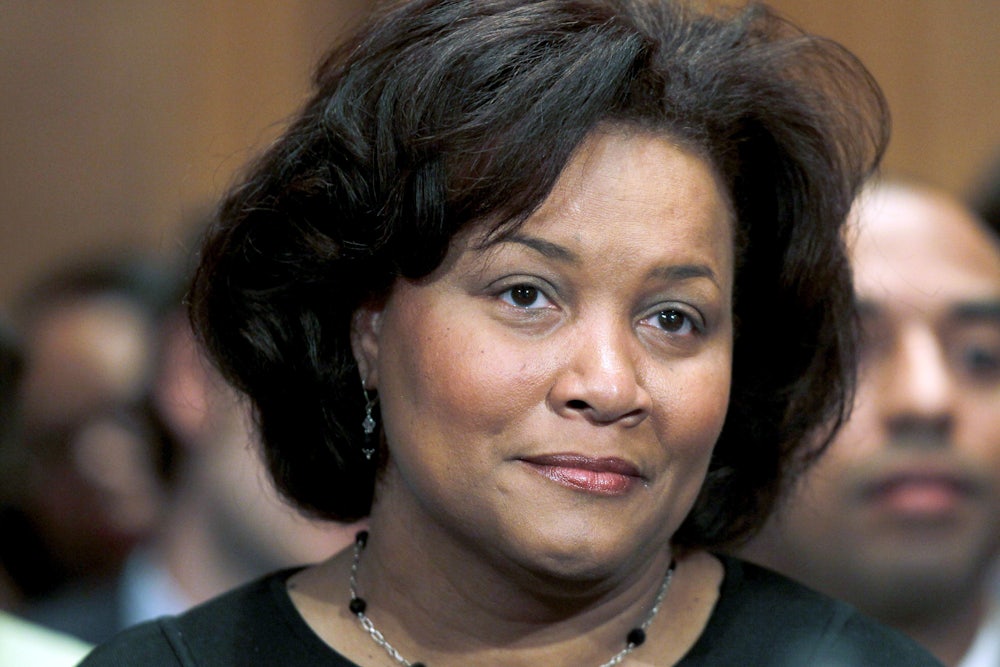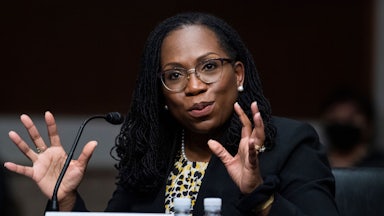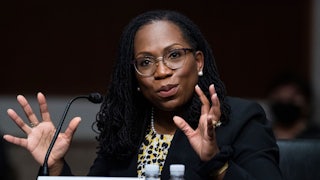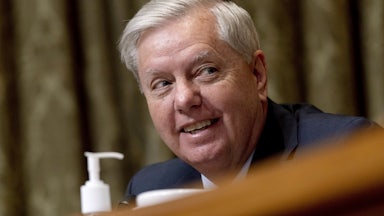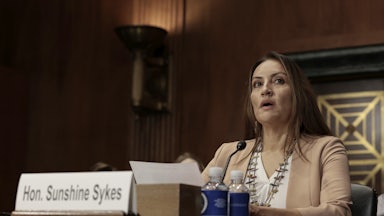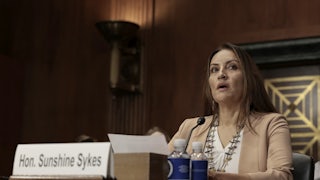I wrote earlier this week about the credentials and experiences that presidents usually seek out in Supreme Court nominees. Some of the names reportedly on Biden’s shortlist match the generic profile of would-be justices over the past few decades: They have Ivy League educations, they clerked for Supreme Court justices, they held high positions in government or legal academia, and they serve on major appeals courts.
One of the Biden shortlisters does not fit that mold, however. Judge J. Michelle Childs currently serves on the U.S. District Court for South Carolina. She attended public universities as an undergraduate and as a law student. After working at a local law firm in South Carolina, she joined the state’s Department of Labor and then served on the state’s Workers’ Compensation Commission. Indeed, she resembles most judges—and most Americans—more than she resembles the elite coterie of lawyers who are usually selected for the highest court in the land. But the career that sets her apart from other more typical Supreme Court nominees is the very thing that has left her vulnerable to liberal critics, while occluding the nuances that might alleviate those critics’ fears.
Childs’s rise is a nod to South Carolina Representative Jim Clyburn, the highest-ranking Black Democrat in Congress. Clyburn’s endorsement of Biden on the eve of the South Carolina primary in 2020 helped him secure that must-win state and, eventually, the Democratic nomination. It was also Clyburn who pushed Biden to pledge that he would nominate a Black woman to serve on the Supreme Court if a vacancy arose during his term. Just over a year after Biden’s inauguration, Justice Stephen Breyer announced his retirement and gave the president the opportunity.
Last month, Biden nominated Childs for the influential D.C. Circuit Court of Appeals, the current home of fellow Supreme Court shortlister Ketanji Brown Jackson. (That nomination is on hold while Childs is under consideration to replace Breyer, the White House said this week.) Clyburn’s support could elevate her even higher. He has mounted an aggressive campaign to press the White House to nominate her, not-so-subtly leaning on his pivotal role in Biden’s struggling presidential campaign. Some Republican senators, including South Carolina’s Lindsey Graham and Tim Scott, have also suggested they could support her nomination if Biden selects her.
Many of Childs’s most high-profile rulings will be welcomed by Democrats. In 2020, she struck down provisions in South Carolina election law that required absentee-ballot applications to be signed in the presence of a witness, citing the Covid-19 pandemic. (While the Fourth Circuit upheld her ruling, the Supreme Court later reversed it.) In 2014, Childs ruled against South Carolina when it tried not to recognize a same-sex couple’s marriage in another state, before the Supreme Court’s landmark ruling in Obergefell v. Hodges the following year. And last December, she upheld a nuclear power plant’s Covid-19 vaccine mandate after a group of contractors sued to overturn it.
In recent days, however, Childs’s record has also come under scrutiny from concerned liberal and left-leaning groups. The American Prospect’s Alex Sammon highlighted some of her work in private practice representing companies against workers who brought discrimination and harassment claims, as well as some cases as a judge where higher courts overturned her rulings against criminal defendants. Sammon suggested that Childs’s résumé is at odds with the Biden administration’s commitments on labor rights and criminal justice reform. Clyburn, in a statement to the Prospect, dismissed the argument as “preposterous.”
Some factions in the Democratic coalition are also pushing back against a potential Childs nomination, with varying degrees of specificity and intensity. According to The Washington Post, labor leaders are publicly and privately signaling to the White House that they would prefer a nominee who hasn’t worked for a law firm with a history of opposing unions, and some Democratic lawmakers are circulating letters calling for a nominee who “understands the plight of workers” and would “put workers first.” While a certain amount of intraparty jockeying accompanies every Supreme Court nomination, it more often takes place behind the scenes.
One case highlighted by the Prospect was that of Benjamin Heyward, a prisoner who sued a prison guard for pepper-spraying him during an argument about cleaning materials for his cell. According to the Fourth Circuit Court of Appeals, Heyward claimed “that, as a result of the incident, his eyes burned for approximately one hour and were swollen for three days, and he had a headache for seven days, chest pain for five days, and mental and emotional injuries for seven days.” He then filed a Section 1983 lawsuit against the guard for excessive force.
Childs ruled against Heyward because his injuries were minimal and thus didn’t rise to the level of an excessive-force claim, citing Fourth Circuit cases where the court had held similarly in other pepper-spray-related cases. The Fourth Circuit itself reversed Childs’s ruling in an unpublished opinion, however, after concluding she had applied the wrong test for Heyward’s case. It concluded that Childs erred because she “focused on de minimis injury, instead of considering whether the pepper spray amounted to more than de minimis force.” The case was later reassigned to another judge who ruled in Heyward’s favor, and court records indicate that the state settled with the prisoner for almost $10,000.
While her ruling was found to be in error, it’s hard to extrapolate Childs’s overall judicial philosophy from this case or the handful of others raised by critics. For one, as a district court judge, Childs handles far more cases each year than a federal appellate judge and orders of magnitude more cases than a Supreme Court justice. Alliance for Justice, a liberal judicial-advocacy group, said that Childs has presided over almost 5,000 cases since joining the District Court in 2010 and issued written opinions in more than 2,500 of them.
District court judges are also bound in ways that their colleagues in the federal appellate courts are not. Like all judges, they apply precedents from higher courts. Unlike judges in higher courts, they have far less influence over what those precedents look like. Childs could credibly say that she was applying the Fourth Circuit’s precedents in the Heyward case and that the error was only which precedents should be applied. Since district court judges operate alone, they also do not have the opportunity to write concurring or dissenting opinions. This means they have far fewer opportunities to express their own judicial philosophy.
It also isn’t clear whether the reversals cited by her critics are unusual. If district court judges were never wrong, there wouldn’t be appellate courts. According to AFJ, Childs’s decisions “have either been reversed or vacated in less than one percent of the cases she has presided over.” Appeals were only sought in about 500 of her cases, so that would suggest that the Fourth Circuit overturned Childs’s rulings in fewer than 10 percent of her cases it reviewed. While statistics on district court judge reversals in general aren’t readily available, her reversal rate does not appear to be unusual or egregious.
Childs’s private-practice work understandably gives unions cause for concern. At the same time, it’s also prompted the most pushback from Clyburn and other allies, who’ve pointed to her lengthy experience in the South Carolina Department of Labor and as a workers’ comp judge for the state commission. A lawyer at the same firm where Childs worked told the Post that she had also represented workers on the other side of discrimination and harassment claims but that records of those cases would be harder to obtain because they often resulted in out-of-court settlements.
All of this might be why presidents from both parties have preferred nominees with the generic résumé over the last 30 years. Prospective justices who worked for, say, the Justice Department or a U.S. attorney’s office draw fewer opportunities for criticism than those who work in private practice. Federal appellate judges, especially those on the D.C. Circuit, hear fewer cases and thus fewer controversial cases. They’ll also serve on three-judge panels where responsibility for the outcome can be diffused among other judges. And they’ll write opinions that give them more opportunities to highlight how they think about broad issues. It’s probably not a coincidence that the last Supreme Court justice with state court experience was David Souter, whom Republicans expected to be conservative but who turned out to be a reliable liberal vote.
There’s no reason to believe that Childs’s critics are inspired by anything other than good-faith concerns. But continuing to draw Supreme Court prospects from such a narrow set of backgrounds simply to avoid such political inconveniences has risks of its own: It could make the Supreme Court deeply unrepresentative in more subtle ways.
As I noted the other day, there are multiple former prosecutors on the court but no public defenders, and there is only one justice who didn’t go to law school at Harvard, Yale, or Columbia. And since many of these plum positions are concentrated on the East Coast, other parts of the country get short shrift. Childs is an exception that proves the rule: Her nomination is getting so much attention precisely because a key political ally of the president supports her, something that most other prospects who don’t fit the generic résumé lack. She could ultimately provide the court with a more diverse set of experiences—if, of course, those experiences don’t stop her from being nominated in the first place.
